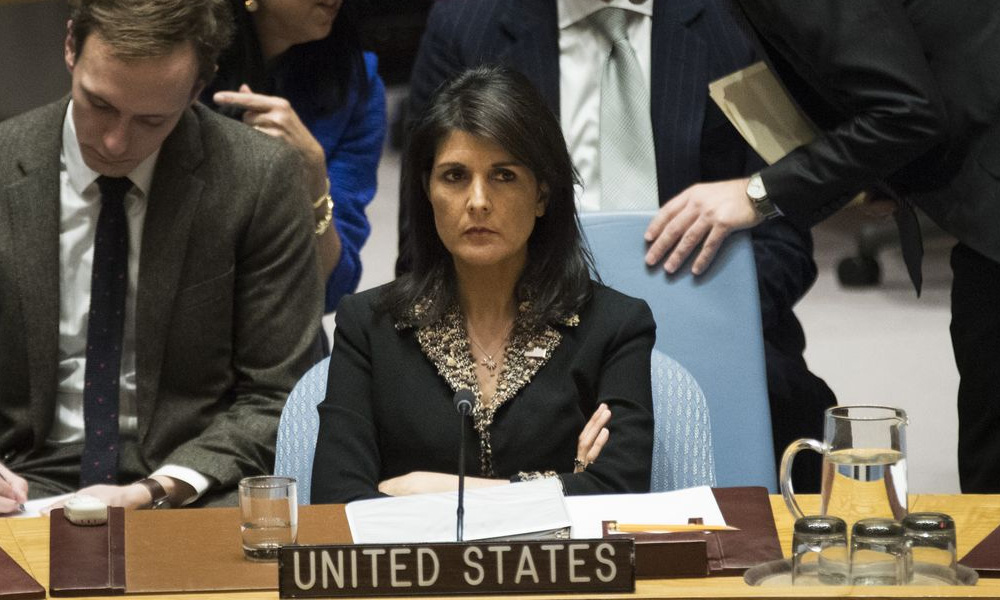 The United States Ambassador to the UN, Nikki Haley, warned recently, in what can only be described as the height of arrogance, that the US “will be taking names” during an upcoming vote in the UN General Assembly on the status of Jerusalem. In a letter to dozens of member states, including our own I suppose, she put them on notice that “the President and the US take this vote personally.”
The United States Ambassador to the UN, Nikki Haley, warned recently, in what can only be described as the height of arrogance, that the US “will be taking names” during an upcoming vote in the UN General Assembly on the status of Jerusalem. In a letter to dozens of member states, including our own I suppose, she put them on notice that “the President and the US take this vote personally.”
She also warned that she had been instructed to send the names of all countries that vote against the US directly to President Trump, presumably for further action.
In other words, there will be consequences – retaliation or punishment – if countries do not support the US on this issue.
Trump himself has complained that other countries “take hundreds of millions of dollars and even billions of dollars [from us], and then they vote against us.” Clearly, Trump intends to link foreign assistance with how countries vote on issues important to the US.
Malaysia receives about US$10 million annually, mostly in military assistance.
The US warning comes after a vote earlier this week on a resolution in the UN Security Council which overwhelmingly condemned Trump’s decision to move the US embassy from Tel Aviv to Jerusalem. Fourteen out of the 15 members of the Council voted for the resolution. Although the US vetoed the resolution, the message from the international community was clear enough.
Stung by the vote in the council, Ambassador Haley is now trying to forestall a similar rebuke in the UN General Assembly where the Permanent Five do not enjoy veto powers. The 193-member UN General Assembly will hold a rare emergency special session on Thursday at the request of Arab and Muslim states to discuss the US decision on Jerusalem.
If precedent is anything to go by, the US will very likely suffer a crushing defeat on this issue when the Assembly votes.
Self-appointed class monitor
Whichever way you look at it, Ambassador Haley’s letter is nothing less than big-power bullying. After insisting in the UN Security Council that the US will not be bullied into deciding where to locate its embassy in Israel, she is now proceeding to bully the rest of the world into acquiescing in the US decision.
While big powers often indulge in high-powered lobbying to gain support on critical issues, they rarely resort to such threatening and demeaning language, behaving like some self-appointed class monitor taking names of unruly students to report to the headmaster for punishment.
Even in far more critical situations before – on the eve of the first Iraq War, for example – when the US was desperately trying to obtain international consensus, the US never resorted to threats. I recall a meeting in early 1990 between our then foreign minister Abu Hassan Omar and US Secretary of State James Baker in Los Angeles, when the US laid out its case for the invasion of Iraq and the liberation of Kuwait.
Trump and his team now appear to be bringing the proverbial big stick to the table of international diplomacy, hoping to bully and cajole their way in international affairs. If Trump thinks this is the way to enhance US power and prestige, he is going to be disappointed. Threats might work in limited circumstances but it is no substitute for diplomacy and consensus building.
As the continuing standoff with North Korea aptly demonstrates, the US needs international support and consensus to help resolve important security issues.
Besides, as the world returns once again to a more multipolar global architecture, thanks to the rise of China, bullying might just prove to be counterproductive.
As for Jerusalem, whether the US likes it or not, its status is going to have to be decided at some future time as part of a peace agreement between Israel and Palestine. Moving the US embassy might make for popular politics at home but that does not make it the right thing to do for other nations.
I hope the General Assembly will send a resounding message to President Trump that the world will not be bullied this way, and that Malaysia’s name will be on that list that Ambassador Haley sends to the White House.
I, for one, will consider it a badge of honour.
Article by - DENNIS IGNATIUS is a former Malaysian ambassador.
No comments:
Post a Comment